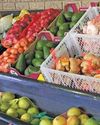
The fascination with Japan has grown over the years, thanks to greater exposure to Japanese culture. Geishas, samurai, anime and other elements of Japanese culture continue to inspire and interest those who exist outside of the homogenous confines of the Land of the Rising Sun.
Agriculture is not usually associated with Japan, as the country’s mountainous terrain means that only around 12% of its land is suitable for cultivation. Famous for its world-class Wagyu beef, Japan is also known for the production of various fruit, including melons that sell for astronomical prices. The exceptional care taken in producing each melon is one of the many reasons they can be auctioned off for such high prices.
WORLD’S MOST EXPENSIVE MELONS
In May 2019, two Yubari King melons from Hokkaido in Japan sold for ¥5 million or US$45 000 (over R1 million when taking inflation into account). While the Yubari King remains the world’s most expensive fruit, melons in Japan generally fetch high prices.
According to the YouTube channel Business Insider, melons are not thought of as ‘snacks’ as they are in other parts of the world. Instead, a melon is a luxury item and is particularly important in Japan’s gift-giving culture.
Crown melons, for example, are renowned for their hefty prices, and can fetch around US$200 (R3 600) each, Business Insider explained. The Crown melons are only grown in the Shizuoka prefecture in Japan, and each one is grown with the utmost care.
This story is from the September 06, 2024 edition of Farmer's Weekly.
Start your 7-day Magzter GOLD free trial to access thousands of curated premium stories, and 9,000+ magazines and newspapers.
Already a subscriber ? Sign In
This story is from the September 06, 2024 edition of Farmer's Weekly.
Start your 7-day Magzter GOLD free trial to access thousands of curated premium stories, and 9,000+ magazines and newspapers.
Already a subscriber? Sign In

Agripreneur wins top award for butternut coffee
Bloemfontein-based agripreneur Chantelle de Bruyn has achieved global recognition.

Final fresh produce inquiry pins low level of transformation on farming environment
The Competition Commission released its final report on the Fresh Produce Market Inquiry in mid-January, maintaining that transformation in the industry was being impeded by a lack of support for emerging farmers.

Illegal fishing in Australia reveals market gap for farmed sea cucumber
Illegal fishing practices in Australia have revealed a large market opportunity for sea cucumber farming.

An introduction to the Ford Ranger Tremor
In December 2024, the CAR magazine team received the Ford Ranger Tremor to accompany them through the festive season and into the new year. Oliver Keohane looks at what the Tremor is all about.

A farmer's experience with bush encroachment
Farmer David Addenbrooke has worked in the Zimbabwean beef industry for around four decades. Here, he relates his experience with bush encroachment and offers farmers some advice on battling this scourge.

Good rains boost SA's summer grain crop prospects
This week, Absa AgriBusiness analyses several market dynamics and shares its expectations for local grain and oilseed prices over the coming months.

A self-help tool for getting young people engaged in agriculture
The active engagement of the youth in agriculture is pivotal to the sustainability and growth of the sector. Empowering them with the necessary support is key to nurturing future farmers who are equipped to overcome future challenges like the effects of climate change.Dr Primrose Madende, researcher at the Department of Agricultural Economics at the University of the Free State

Rallying to the cackle of this raucous bird
The gregarious and territorial Green Wood-hoopoe, also known as the Red-billed Wood-hoopoe, is extremely vocal and is often heard before it is seen. And for very good reason,

SA coffee lovers can expect price increase
South African coffee prices are expected to spike sharply in the foreseeable future because of failed crops in the country’s main importing countries: Brazil and Vietnam.

Paving the way for a greener dairy industry
The dairy industry is often criticised for its environmental impact, but a new innovation called DESTiny aims to empower farmers to take control of their carbon footprints. Riana Reinecke, the tool's developer, explained to Glenneis Kriel how it works and how farmers can benefit from it.